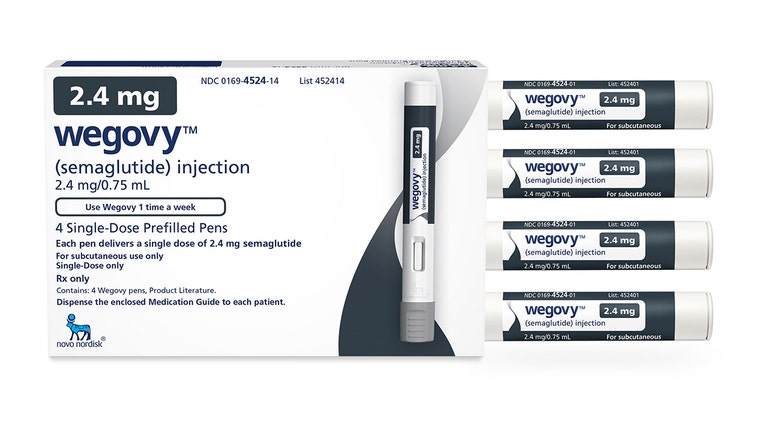Weight-loss drug called Wegovy receives FDA approval

This product packaging promotional photo shows the newly FDA-approved injectable medication Wegovy. (Image Courtesy of Novo Nordisk)
An under-the-skin injection that showed promise in weight-loss clinical trials is now fully approved for certain obese or overweight Americans.
The U.S. Food and Drug Administration on Friday announced the approval of pharmaceutical giant Novo Nordisk's Wegovy (semaglutide) injection for adults who either have obesity or are overweight and have at least one weight-related condition such as high blood pressure, type 2 diabetes, or high cholesterol.
Wegovy is the first drug approved for chronic weight management since 2014, according to the agency.
Is Wegovy a Weight-Loss Shot?
The FDA is not calling Wegovy a "weight-loss shot" but rather "a beneficial new treatment option" for Americans to "incorporate into a weight management program," according to the FDA's Dr. John Sharrett.
"FDA remains committed to facilitating the development and approval of additional safe and effective therapies for adults with obesity or overweight," Sharrett said.
Wegovy is taken once a week in conjunction with a reduced-calorie diet and an exercise program, the FDA said. Patients start with a lower dose and then gradually — over about four to five months — increase the weekly dosage to 2.4 milligrams. This is done to reduce gastrointestinal side effects, the FDA said.
Wegovy is actually just a higher dosage of the same active ingredient — semaglutide — used in Ozempic, which is an injection treatment for type 2 diabetes approved in 2017. The full Wegovy dose is 2.4 milligrams of semaglutide whereas the typical Ozempic dose is 1 milligram of semaglutide.
How Does Wegovy Work?
"One key misunderstanding is that [obesity] is a disease of willpower, when in fact there is underlying biology that prevents people from losing weight and keeping it off," Novo Nordisk stated in a news release. "Obesity is influenced by a variety of factors, including genetics, appetite signals, behavior and the environment."
Wegovy works by mimicking a gut hormone that targets parts of your brain that regulate appetite and food intake, according to the FDA. This naturally occurring hormone is called glucagon-like peptide-1, or GLP-1, and it helps people feel full when they eat, according to researchers.
What Are the Clinical Trial Results?
The drug was studied in four trials each lasting 68 weeks. In these studies, more than 2,600 patients received Wegovy for up to 68 weeks and more than 1,500 patients received a placebo. In one trial, patients who took Wegovy lost an average of 14.9% of their body weight compared to 2.4% loss for patients on the placebo, according to Novo Nordisk. "In addition, 83.5% of patients achieved 5% or more body weight reduction in the Wegov arm vs. 31.1% for placebo," the company said.
"This is the first time we have seen this magnitude of weight loss with a medicine, " said Dr. Robert Kushner, a professor of medicine and medical education at Northwestern University, who led the Novo Nordisk-funded phase 3 clinical trial.
"This approval gives people with obesity a once-weekly, non-surgical option with results that have never been demonstrated with an anti-obesity medicine before," Kushner added. "The approval of Wegovy represents a turning point for healthcare providers to embrace medical management of obesity to help improve chronic weight management for patients."
What Are the Common Side Effects?
The most frequently reported side effects of Wegovy were nausea, diarrhea, vomiting, constipation, abdominal pain, headache, fatigue, indigestion, dizziness, abdominal distension, belching, hypoglycemia in patients with type 2 diabetes, flatulence, gastroenteritis, and gastroesophageal reflux disease.
Possible Cancer Risk
Wegovy carries a warning to patients and doctors about a potential risk of thyroid C-cell tumors.
"Wegovy should not be used in patients with a personal or family history of medullary thyroid carcinoma or in patients with a rare condition called Multiple Endocrine Neoplasia syndrome type 2 (MEN 2)," the FDA said in its news release.
In studies done on rats, Wegovy and similar medications appeared to cause thyroid tumors, including thyroid cancer. Researchers do not know if Wegovy could cause thyroid tumors in humans.
"Tell your healthcare provider if you get a lump or swelling in your neck, hoarseness, trouble swallowing, or shortness of breath," Novo Nordisk states in its warning. "These may be symptoms of thyroid cancer."

